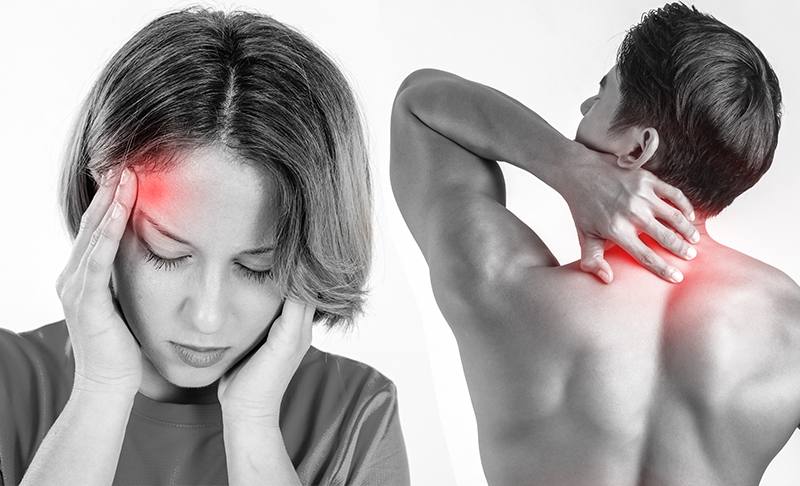Most people probably grind and clench their teeth from time to time, medically called bruxism. Occasional teeth grinding does not usually cause harm, but when teeth grinding occurs on a regular basis the teeth can be damaged and other complications can arise. Although teeth grinding can be caused by stress and anxiety, it often occurs during sleep and is more likely caused by an abnormal bite or missing or crooked teeth. The NTI-tss migraine prevention device also gives dentists a way to simply and effectively treat patients suffering from tension and migraine headaches by reducing the intensity of jaw clenching while the patient sleeps.
Because grinding often occurs during sleep, most people are unaware that they grind their teeth. However, a dull, constant headache or sore jaw are telltale symptoms of bruxism. Many times people learn that they grind their teeth by their loved one who hears the grinding at night.
If you suspect you may be grinding your teeth, talk to your dentist. He or she can examine your mouth and jaw for signs of bruxism, such as jaw tenderness and abnormalities in your teeth.
WHAT CAN I DO TO STOP GRINDING MY TEETH?
Your dentist can fit you with a mouth guard to protect your teeth during sleep. If stress is causing you to grind your teeth, ask your doctor or dentist about options to reduce your stress. Attending stress counseling, starting an exercise program, seeing a physical therapist or obtaining a prescription for muscle relaxants are among some of the options that may be offered.
Other tips to stop teeth grinding include:
- Avoid or cut back on foods and drinks that contain caffeine, such as colas, chocolate, and coffee.
- Avoid alcohol. Grinding tends to intensify after alcohol consumption.
- Do not chew on pencils or pens or anything that is not food. Avoid chewing gum as it allows your jaw muscles to get more used to clenching and makes you more likely to grind your teeth.
- Train yourself not to clench or grind your teeth. If you notice that you clench or grind during the day, position the tip of your tongue between your teeth. This practice trains your jaw muscles to relax.
- Relax your jaw muscles at night by holding a warm washcloth against your cheek in front of your earlobe.
WHAT CAUSES TMD?
Temporomandibular disorders (TMD) occur as a result of problems with the jaw, jaw joint and surrounding facial muscles that control chewing and moving the jaw.
The cause of TMD is not clear, but dentists believe that symptoms arise from problems with the muscles of the jaw or with the parts of the joint itself. Injury to the jaw, temporomandibular joint, or muscles of the head and neck – such as from a heavy blow or whiplash – can cause TMD. Other possible causes include:
- Grinding or clenching the teeth, which puts a lot of pressure on the TMJ
- Dislocation of the soft cushion or disc between the ball and socket.
- Presence of osteoarthritis or rheumatoid arthritis in the TMJ.
- Stress, which can cause a person to tighten facial and jaw muscles or clench the teeth.
WHAT ARE THE SYMPTOMS OF TMD?
The cause of TMD is not clear, but dentists believe that symptoms arise People with TMD can experience severe pain and discomfort that can be temporary or last for many years. More women than men experience TMD and TMD is seen most commonly in people between the ages of 20 and 40.

Common symptoms of TMD include :
- Pain or tenderness in the face, jaw joint area, neck and shoulders, and in or around the ear when you chew, speak or open your mouth wide
- Limited ability to open the mouth very wide
- Jaws that get “stuck” or “lock” in the open- or closed-mouth position
- Clicking, popping, or grating sounds in the jaw joint when opening or closing the mouth (which may or may not be accompanied by pain)
- A tired feeling in the face
- Difficulty chewing or a sudden uncomfortable bite – as if the upper and lower teeth are not fitting together properly
- Swelling on the side of the face
Other common symptoms include toothaches, headaches, neckaches, dizziness, earaches, hearing problems, upper shoulder pain, and ringing in the ears (tinnitis).rom problems with the muscles of the jaw or with the parts of the joint itself.
GETTING STARTED BRUXISM TREATMENT
STEP 1
Find a Sleep Medicine dentist.
STEP 2
Get proper diagnosis / wearable sleep medicine device.
STEP 3
Attend follow-ups.
FAQ : BRUXISM TREATMENT
Q: What are the effects of Bruxism?
A: Bruxism can result to toothache, receding teeth, teeth sensitivity, headache and disturbed sleep.
Q: What are the causes of Bruxism?
A: Bruxism is mostly associated to the mental state and lifestyle. Stress,food, such as caffeinated beverages (coffee, soft drinks, etc.), alcohol, cigarettes, substance abuse and some medications are some of the catalysts.
Q: How is Bruxism treated?
The proper treatment for each individual depends on the cause of the disease. In most cases, the dentist will recommend a patient to wear a dental splint to reduce tooth wear during bedtime. .
For those who are interested in orthodontics and cosmetic dentistry at reasonable prices Denta-joy Dental Clinic is a specialist in this field. We are ready to provide advice and treatment by specialist doctors. You can ask for more details at
Line Official: @dentajoy
โทร 095-491-8659

